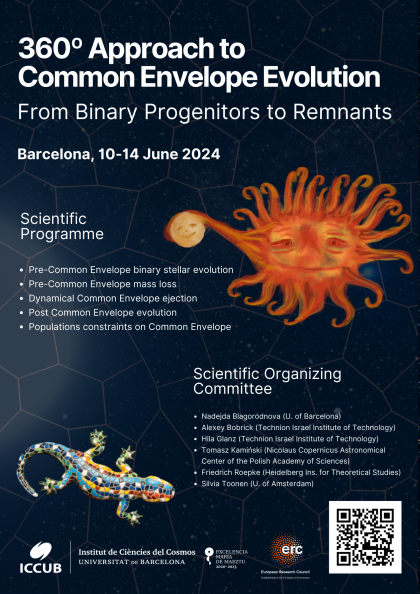360º approach to Common Envelope Evolution: From Binary Progenitors to Remnants
Common envelope evolution (CEE) is one key aspect of binary stellar evolution. Due to its high complexity, it is also the least understood, as current computational and theoretical approaches cannot describe the full process from the initial evolution of the progenitor binary system to unstable mass transfer, dynamical ejection (astrophysical transient), and final evolution of the remnant system. The goal of this workshop is to stimulate new collaborative research in this field by combining theory, simulations, population synthesis, and observations. To do this, we aim to review the state of the art for each CE stage, identify the main challenges, and, through discussions, envisage a strategy to approach them from a multi-disciplinary perspective. The full list of science topics can be found here.
Due to the highly interactive format of the workshop, we encourage in-person attendance, although online participation will also be possible. Registration can be done through the workshop´s website, where you can also find the preliminary program, and additional information about the venue. The relevant dates for this workshop are explained here. Because of its interactive nature, the workshop will have a limited number of participants, which will be notified on the 1st of March 2024.
We encourage early registration and reservation of accommodation and travel since economic hotels and flights fill in very rapidly in Barcelona in the summertime.
The organization offers funds to cover the accommodation expenses for a limited number of participants. If you need financial support, please contact the SOC.
Scientific Organizing Committee
- Nadejda Blagorodnova (University of Barcelona, Barcelona, Spain)
- Alexey Bobrick (Technion Israel Institute of Technology, Haifa, Israel)
- Hila Glanz (Technion Israel Institute of Technology, Haifa, Israel)
- Tomasz Kamiński (Nicolaus Copernicus Astronomical Center of the Polish Academy of Sciences, Toruń, Poland)
- Friedrich Roepke (Heidelberg Institute for Theoretical Studies, Heidelberg, Germany)
- Silvia Toonen (University of Amsterdam, Amsterdam, The Netherlands)
